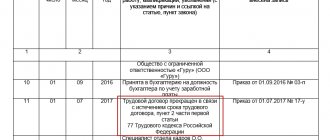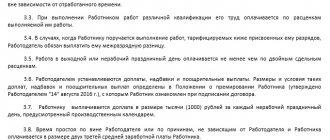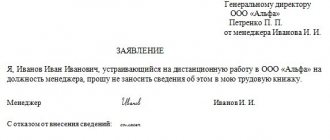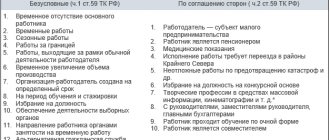Home / Labor Law / Dismissal and layoffs / Dismissal
Back
Published: 04/14/2016
Reading time: 8 min
0
1800
Unlike an employer, who can dismiss an employee on his own initiative only in cases established by law, an employee has the right to terminate an employment contract ahead of schedule at any time . This right is granted to an employee of the Labor Code of the Russian Federation, namely Art. 80 of this regulatory legal act.
The features of this procedure, as well as the rules for its implementation, are worth considering in more detail.
- Legal grounds for termination of the contract
- Conditions for termination of the contract
- Termination procedure Notification to employer
- Preparation of documents for dismissal
- Paying the employee and issuing him a work book
Legislation and terms of termination of the contract
The Labor Code of the Russian Federation, or more precisely in Article 77, paragraph 3, talks about the possibility of an employee leaving at his request. The procedure for termination is described in more detail in Article 80. Thus, it is emphasized that a person has the right to terminate an employment agreement on his own initiative. In this case, it is necessary to inform the employer about this at least 2 weeks in advance by submitting a corresponding written application.
The specified period is counted from the day following the day the paper is submitted for consideration.
For example, you submit an application for consideration on February 1, therefore, the countdown of 2 weeks begins on February 2. February 15 is the last working day. This is done so that the employer can promptly find a replacement for the departing employee. In addition, during this time, the employee himself can think about his decision and change it. But this only applies to specialists who do not hold managerial positions and work under a contract that was concluded for a period of 2 months or more. For persons holding managerial positions, the duration of “working off” is slightly longer than specified in the article, and is a month.
A minimum period of 3 days is established for seasonal workers and persons who have entered into an employment contract whose duration is less than 2 months.
Persons working for an employer who is an individual are guided by the terms assigned in the employment contract they previously concluded. The same applies to persons who work in religious organizations.
You can submit an application at any time, even during vacation or while on sick leave. Please note that only the minimum periods for notifying the employer are indicated. You can write an application a month or two before the expected date of departure.
Termination in this way is possible for both fixed-term and unlimited-term contracts.
Is work required?
The procedure for terminating a contract with an employer at the initiative of an employee involves working off. A two-week period is a standard amount of work, which allows you to prepare in advance for the departure of an employee, organize his replacement and pay the due compensation.
However, it must be remembered that the Labor Code considers 2 weeks as the minimum period, and if a different period is mentioned in the internal regulations of the enterprise, they proceed from the provisions adopted in the organization.
- Is it necessary to work off a probationary period upon dismissal?
Upon receipt of an application from hired personnel, the employer is not authorized to cancel the termination of the employment contract, but may influence the setting of the date of separation. The last day of work may come earlier than 2 weeks if the parties come to a common conclusion that work is not required.
When the employment contract is terminated, the personnel department and accounting department are obliged to promptly prepare the estimated payment and return personal documents with prepared certificates.
Early dissolution
Speaking about the timing of termination, we can highlight the possibility of dismissal before the expiration of two mandatory weeks.
The parties can agree and terminate the agreement earlier, without referring to the agreement of the parties and without concluding the relevant paper. For example, if a request to terminate the contract was made in writing earlier than two weeks, and the employer imposed a resolution allowing such dismissal, then the employee is dismissed earlier. If an agreement is not reached, he should work for the allotted time. Absenteeism from work and termination of duties without notice of dismissal is considered a violation of discipline. Then the labor record states that the employee was fired due to violation of labor discipline.
You cannot dismiss a citizen who has submitted an application earlier if he does not agree. Thus, it is possible to shorten the “working off” period only with the consent of both parties.
In some cases, immediate dismissal is possible. These include the following reasons:
- Full-time admission to a university or other educational institution.
- Reaching retirement age.
- Transfer of a spouse to another city or region.
- A violation in the activities of the employer associated with a violation of the rights of the person who submitted the application for dismissal, any clauses of a previously concluded contract.
Results
The principle that an employer should follow in situations involving the dismissal of an employee on his own initiative is not to curtail the rights of the dismissed person as prescribed in labor legislation, but in controversial situations to compromise with him.
We should also not forget to record the results of the mutual agreement reached. You can find more complete information on the topic in ConsultantPlus. Free trial access to the system for 2 days.
Reasons for dismissal of employees
When dismissing under Article 80 of the Labor Code of the Russian Federation, one cannot help but touch upon a topic that concerns the main reasons for this action. So, writing a statement may be related to:
- Reaching retirement age or applying for a long-service pension.
- Studying at a university or technical school, full-time school. Of course, if the training is directly related to obtaining an education in a specialty related to the position held, instead of dismissal, we may be talking about transferring to part-time work. If a person decides to get a new profession, most likely he will quit and look for a new job in his specialty.
- Violation of labor legislation by the employer, as an option, is a delay in wages or irregular working hours.
- By moving to another city or region, sometimes even a city district. Moreover, this could be either the relocation of the employee himself or the second spouse.
- State of health. It is not necessary that medical indications prohibit working at an enterprise; sometimes it is enough for a person to know that he is seriously ill in order to leave work. Thus, teachers who are diagnosed with cardiovascular diseases often leave their jobs, since working at school can provoke a deterioration in their health.
- Moving to another job. Often associated with salary or an offer of a higher position.
- Lack of prospects for further advancement. Young and ambitious employees often leave because of this.
- Unfavorable working conditions – cold rooms, inconvenient work schedule.
- Unfavorable relationships within the team, frequent quarrels with superiors.
Should you indicate the reason for leaving?
Before changes to labor legislation, the employee was required to indicate the reasons for leaving in the application. After the adoption of the new code, this need disappeared. Numerous and varied reasons for dismissal can now be replaced by one phrase: “at one’s own request.” However, there are cases when the reasons need to be indicated:
- If a citizen does not have the opportunity to stay for two weeks of work;
- If the reason for dismissal must be entered into the work book to receive benefits and allowances (for example, a work injury).
The Labor Code includes the concept of “good reason for dismissal.” If a citizen retires or goes to study, he may not work the required days. It is worth noting that these motives must be confirmed by a certificate, for example, a call from a higher educational institution. The list of reasons for urgent dismissal without work is given in Part 3 of Article No. 80 of the Labor Code of the Russian Federation.
Drawing up an application for termination of an employment contract
The only and sufficient basis for termination of a previously concluded employment agreement at the initiative of the employee is considered to be a statement written by him.
The document is drawn up in the name of the head of a structural unit or enterprise in writing, both by hand and in printed form. You are not required to state the reason why you are resigning, unless there are special situations that require quick dismissal. For example, the same thing: enrollment in a university. In this situation, it would also be appropriate to attach a copy of the enrollment order or a certificate received from the university.
Writing and submitting an application for consideration is of a notification nature, not a permitting one.
example of writing a resignation letter in .doc (Word) format The application can either be handed over to the manager personally, or sent by registered mail, always with a list of attachments. In the first case, it is important to draw up a second copy and ask the manager to mark on it that he has received the application. In this case, you must indicate the date of receipt, position and sign. This will protect you from a situation where the manager may say that he did not receive the application or it was lost.
Procedure
In case of such early departure from the workplace, it is necessary to adhere to the general rules defined by law for terminating fixed-term employment contracts of any type.
The main responsibility of the employee in this case is to timely notify his superiors of his desire to leave work, drawn up in writing. This period is strictly regulated by certain regulations, and the time for filing a notice differs from other categories.
In accordance with the general rules prescribed in Art. 80 of the Labor Code, the employer must receive written notice of termination of the contract two weeks before the day the employee leaves. This order is valid in most situations.
For the management of companies, enterprises or representative offices, it is better to send notice of termination thirty days before leaving. In this case, the owner of the organization will have time to select a replacement for a leadership position.
A one-month period for providing notice before terminating a contract is provided for athletes and their coaches if the contract was concluded for a period of more than four months.
Another right of an employee, which Russian legislation has given him and which he can use to the fullest, is the withdrawal of a letter of resignation within the period while the notice is valid (from three to thirty days for different situations).
How to proceed and what documents to prepare:
- The employee draws up an application for termination of the contract in written or printed form (it is also a notice), and then submits it to the employer. Warning is provided not only during the working period, but also if the employee is on sick leave or on vacation. The paper contains a request to leave work and the date of this resignation. A signature is placed at the bottom and the day the paper is submitted is written (it must comply with the rules described above).
- The employer generates an order in the T-8 form indicating the basis, that is, the application received from the employee, the date of its receipt and the number specified during registration. The day the employee left is also indicated.
- The order contains the signature of the resigning employee.
- Next, the necessary entry is made in the work book based on the order described above.
- Employees of the accounting department calculate the salary due to the resigning person. The payment is made on the day of departure, at the same time the work book and other documentation that was collected when the person was hired is provided against signature.
Withdrawal of application
An employee may change his mind about quitting.
In this case, he must withdraw the application from the manager. In this case, the manager does not have the right to refuse the employee, but only in the situation if another specialist has not been invited during this time. It is important to know that a person must receive only a written invitation, and in addition, he must belong to the category of persons who cannot be refused to enter into an agreement under the law. This includes specialists invited to work on translation, or students who received a guarantee certificate from the head of the organization after the employee submitted an application. For example, Ivanov I.I. decided to resign of his own free will and wrote a corresponding statement. After 10 calendar days, he decided to pick it up. But the manager had already sent an invitation to Kosoy K.R. with an offer to transfer to them. She agreed and is preparing for the transfer. In this case, Ivanov I.I. can no longer withdraw the application and will be dismissed within the period specified in it. But, if within a month from the date of registration of Kosoy K.R.’s dismissal from her previous place of work, she does not register with the organization for reasons beyond the control of management, Ivanov I.I. may return. The second option is if at the time of dismissal the workplace is vacant, and after the expiration of the period specified in the paper, the specialist does not demand dismissal and returns to his workplace. In such a situation, the employment contract is automatically extended. A previously drawn up resignation letter is considered cancelled.
Commentary on Article 80 of the Labor Code of the Russian Federation
1. Article 80 establishes the general (unified) procedure and conditions for termination at the initiative of the employee of both a fixed-term employment contract and an employment contract concluded for an indefinite period. Thus, the possibility of terminating an employment contract before its expiration at the initiative of the employee is not related to the presence of valid reasons. An employee has the right to terminate any employment contract at his own request at any time. He is only obliged to notify the employer about this in writing no later than two weeks in advance. The head of the organization is obliged to notify the employer (the owner of the organization's property or his representative) in writing about the early termination of the employment contract no later than one month in advance (see commentary to Article 280). An employee who has entered into an employment contract for a period of up to two months, as well as an employee engaged in seasonal work, are required to notify the employer in writing of the early termination of the employment contract three calendar days in advance (see commentary to Articles 292, 296).
2. A written form of resignation is required. An employee's oral statement about termination of an employment contract cannot be the basis for the employer to issue a corresponding dismissal order. The obligation of the employee provided for by the Labor Code to notify the employer of termination of the employment contract at his own request no later than two weeks (the head of the organization - one month in advance) means that he can do this for a longer period. Two weeks (a month) is the minimum period within which an employee is obliged to notify the employer of his desire to terminate the employment relationship. The notice period begins the day after the employer receives the employee’s resignation letter. So, if an employee submitted a letter of resignation on June 1, then the two-week period expires on June 15. This day will be the last day of work (day of dismissal) (see commentary to Article 84.1).
3. In accordance with Part 2 of the commented article, by agreement between the employee and the employer, the employment contract can be terminated before the expiration of the established notice period. It should be borne in mind that in this case the basis for dismissal will be the employee’s own desire, and not the agreement of the parties provided for in paragraph 1 of Art. 77 TK. Termination of an employment contract by agreement of the parties is possible only when the employer’s consent to dismissal has legal significance and without such consent the employment contract cannot be terminated (see commentary to Article 78). In the case where the employee himself has expressed a desire to terminate the employment relationship and asks to be dismissed before the expiration of the established notice period, the employer’s consent to the termination of the employment contract itself has no legal significance. It only matters for determining the specific date of dismissal, because the employee asks to be dismissed before the expiration of the period established for notice of voluntary dismissal. If the parties have agreed to terminate the employment contract before the expiration of the established notice period, the employment contract is terminated on the basis of clause 3 of Art. 77 TC per day determined by the parties.
The agreement of the parties on early (before the expiration of a two-week period) termination of the employment contract must be expressed in writing, for example, in the form of an employer’s resolution on the application of the employee who requested dismissal from a specific date. An oral agreement between the parties cannot be evidence of such an agreement. Judicial practice also testifies to this. Thus, the Supreme Court of the Republic of Buryatia rightfully recognized as unfounded the decision of the Railway Court, which refused gr. L. for reinstatement, pointing out that in L.’s application there is no employer’s resolution that would confirm his consent to terminate the employment contract before the expiration of the notice period. Therefore, based on this statement, it cannot be concluded that there was a bilateral agreement to terminate the employment contract before the expiration of the notice period for dismissal (Review of cassation practice in civil cases of the Supreme Court of the Republic of Buryatia for 12 months of 2006 dated 10/19/2007).
If the employer does not agree to terminate the employment contract before the expiration of the notice period, the employee is obliged to work for the established period. Early termination of work in this case is a violation of labor discipline. Termination of work without notice of dismissal will also be a violation of labor discipline. An employee who leaves work without permission may be fired for absenteeism. In turn, the employer does not have the right to dismiss an employee before two weeks have passed after he submits an application for termination of the employment contract, if the application does not indicate the date of dismissal, or before the expiration of the period specified in the application. During the entire warning period, the employee retains his workplace (position).
4. If an employee’s application for voluntary resignation is due to the impossibility of continuing his work (enrollment in an educational institution, retirement, sending a husband (wife) to work abroad, to a new place of duty and other cases), the employer is obliged to terminate the employment contract in the period specified in the employee’s application.
The same obligation also arises for the employer in cases of established violation by the employer of labor legislation and other regulatory legal acts containing labor law norms, local regulations, the terms of a collective agreement, agreement or employment contract. It is necessary to keep in mind that these violations can be established, in particular, by bodies exercising state supervision and control over compliance with labor legislation, trade unions, labor dispute commissions, and the court (clause 22 of the Resolution of the Plenum of the Armed Forces of the Russian Federation dated March 17, 2004 N 2).
5. The need for termination of an employment contract may arise for an employee not only during the period of work, but also during times when he is absent from work for some reason, for example, during a period of temporary disability, while on vacation, or a business trip. In this regard, the question arises whether the employee has the right to submit a notice of resignation at his own request at this time and whether it is counted towards the notice period for resignation at his own request.
The answer to this question follows from the main purpose of the notice of dismissal, namely: to enable the employer to select a new employee to replace the person resigning on his own initiative. By notifying the employer of dismissal in advance in writing, the employee provides him with such an opportunity. It doesn’t matter whether he is at work, on vacation or sick. From the moment the resignation is submitted, the employer has the right to begin searching for a new employee. Therefore, all this time from the date of filing the application for resignation at one’s own request is counted towards the notice period for dismissal.
If an employee on vacation requests to be dismissed during the vacation period and before the expiration of the statutory notice period, and the employer agrees to this, the dismissal is carried out within the period requested by the employee.
The employer has the right to terminate the employment contract with the employee upon expiration of the notice period for dismissal at his own request and in the event that the employee becomes ill during the notice period and continues to be ill at the end of the notice period, because time of illness does not suspend the period after which the employee is subject to dismissal. Dismissal of an employee at his own request in accordance with his application is also possible during a period of temporary incapacity, because the initiative to dismiss comes from the employee, not from the employer.
6. An employee’s filing of an application to terminate an employment contract at his own request is not always the employee’s actual desire to terminate the employment relationship.
The Resolution of the Plenum of the Armed Forces of the Russian Federation dated March 17, 2004 N 2 clarified that termination of an employment contract at the initiative of an employee is permissible in cases where filing a letter of resignation was his voluntary expression of will. If the plaintiff claims that the employer forced him to submit a resignation letter of his own free will, then these circumstances are subject to verification, and the responsibility to prove them rests with the employee (subparagraph “a”, paragraph 22). At the same time, any pressure from the employer, incl. and the threat to fire him on his own initiative in cases where the employer had any reasons for this. Otherwise, we cannot talk about termination of the employment contract at the initiative of the employee. The Laginsky District Court of Elista quite correctly came to this conclusion, satisfying the claim for reinstatement of the citizen. U., who submitted her resignation at her own request under pressure from her manager, who threatened to “ruin her work book” by dismissing her “under article” for losing a report and failing to submit it (see Review of the judicial practice of the Supreme Court of the Republic of Kalmykia on the consideration of civil cases in cassation and supervisory procedures in 2006).
7. In accordance with Part 4 of the commented article, an employee who has warned the employer about terminating an employment contract at his own request has the right to withdraw his application before the expiration of the warning period (and when granting leave with subsequent dismissal - before the day the leave begins) to withdraw his application, and dismissal in this case is not carried out, provided that another employee is not invited in his place in writing, who, in accordance with the Labor Code and other federal laws, cannot be refused to conclude an employment contract (subclause “c” of paragraph 22 of the Resolution of the Plenum of the Armed Forces of the Russian Federation dated 17.03. 2004 N 2). For example, an employee who has submitted a resignation letter of his own free will cannot withdraw his application if another employee is invited to his workplace (position) by way of transfer from another organization in agreement with the heads of these organizations, because in accordance with Art. 64 of the Labor Code, such an employee cannot be denied an employment contract within a month from the date of dismissal from his previous place of work (see commentary to Article 64).
8. After the expiration of the notice period for voluntary dismissal, the employer has no right to detain the employee. No reasons (monetary debt, the need to finish work begun, material assets not handed over, a hostel not vacated, etc.) can serve as a basis for this. On the day of dismissal - the last day of work - the employer is obliged to give him a work book with a notice of dismissal entered in it, other documents at the written request of the employee and make a settlement with him. On this day, the employee may be released from work for the time necessary to receive a paycheck and work book, if for objective reasons he cannot do this at the end of the working day (shift). If the employee is absent from work on the day of dismissal, then the employer on the same day must send him a notice of the need to appear for a work book or agree to send it by mail. Sending a work book by mail with delivery to the specified address is allowed only with the consent of the employee (clause 36 of the Rules for maintaining and storing work books) (see commentary to Article 84.1).
In the event that the employer does not dismiss the employee after the expiration of the notice period, the employee has the right not to go to work.
9. If, after the expiration of the notice period, the employment contract is not terminated and the employee does not insist on dismissal, the employment contract is considered continued. However, no additional agreements are required in this regard.
By assigning to the employee the right to terminate the employment contract on his own initiative at any time, Art. 80 does not oblige an employee, upon dismissal of his own free will, to indicate in the application the reason why he wants to terminate the employment contract. But if the reason for dismissal in accordance with the law depends on the provision of certain benefits or guarantees to the employee, then such a reason must be indicated in the application.
Refusal to dismiss
Quite often, employers do not agree with such statements, especially if there is a lot of work at the enterprise, but there is no one to do it. Often the following statements are used as the reason for refusal:
- Lack of candidates for the vacant position.
- Unfinished work.
- There is financial debt.
- The report has not been submitted.
The manager has no right to speak out in this way.
He must consider the application and pay the employee two weeks from the date of its submission. Otherwise, he violates the law and will have to answer for this in court. Delaying a work book and any other documents, without which a resigned person cannot get a job, is considered unlawful. If there are problems with the issuance of papers, the employer is obliged to pay for each day that could have been a working day for the person in accordance with legal norms.
How to fire an employee who falls ill during the working period
While a person is on sick leave, he cannot be fired (Part 6 of Article 81 of the Labor Code of the Russian Federation). At the same time, you cannot dismiss on a date other than the one indicated in the application.
You should proceed as follows (Article 84.1 of the Labor Code of the Russian Federation):
- issue a dismissal order on the date indicated in the application;
- separately indicate that the employee could not familiarize himself with the order because he was sick and absent from work;
- invite the employee in writing to appear for the work in person or send by mail a written order to redirect it by postal parcel (registered mail).
Until the written consent of the employee is received to send him the work book, it is stored at the enterprise. The employee can receive it in person within 3 days after submitting a written request for extradition.
Formalities
The last day of an employee deserves special attention.
By this date, the directorate must prepare all papers. The manager is obliged: 1. Issue the appropriate order and familiarize the employee with it against his signature. However, it can be published a few days before dismissal.
2. Hand over the completed work form against the recipient’s signature. The entry in it must contain a link to Article 77, paragraph 3 of the Labor Code of the Russian Federation. An entry citing Article 80 is considered incorrect.
A sample of the correct entry can be viewed below:
Remember, the work report is filled out exclusively on the last working day. Management has no right to arrange it in advance.
3. Pay the employee in full. This includes payments related to wages and compensation if he has vacation time.
4. If there is a written application, other papers may also be issued, such as:
- copies of orders concerning the employee;
- salary certificate;
- characteristic.
To avoid disputes with a former employee, for example, if he did not pick up his work permit on time due to his own fault, the manager is obliged to send a written notification that the employee must come and pick up his documents.
It is best to do this using a registered letter. If the documents are not received within the period specified by law (the last working day), the manager is given 3 working days to return the work permit. The period is counted from the moment of application. In such a situation, the employee no longer has the right to demand immediate issuance of the document.
Consequences
The main feature of a fixed-term employment contract is the strict time frame within which it is valid. During this period, the hired person undertakes to perform the work described in the document, and the employer undertakes to pay for this work in the established amount.
Since time limitation is an immutable requirement, the party who wishes to terminate the agreement takes responsibility for failure to comply with the deadlines allotted for the performance of work activities.
If objections arise, the passive participant in the fixed-term contract has the right to arrange proceedings using the work book and consideration of disagreements in court, if weighty arguments are attached to the case.
In order to correctly terminate a fixed-term employment contract on the employee’s own initiative, he must:
- carefully read the fixed-term contract and establish the clauses that describe the conditions (including compensation for unused vacation upon dismissal);
- establish the reasons indicating non-compliance with these conditions;
- clearly state the reason for dismissal;
- form an agreement between the parties to the contract based on this reason;
- indicate in it a list of papers proving the validity of the operation;
- secure the contents of the document with the employer’s seal and the signatures of the participants.
So, an employee has every right to terminate a fixed-term employment agreement at will, but such a case requires the correct actions to avoid various troubles. It is also optimal to take into account the possibility of early cancellation of the contract at the stage of its conclusion.
Advantages of dismissal on your own initiative
Dismissal for this reason has several advantages for the employee.
- Management cannot refuse to dismiss you, and is obliged to part with you after the expiration of your service period.
- Within 3 weeks after dismissal, you will be accrued seniority; if you provide a valid reason, the period will be a month.
- If you change your mind about leaving, you can withdraw your application.
- When registering, you will receive benefits, which are calculated based on the minimum wage. This is especially convenient if you previously worked part-time or received the minimum wage.
List of payments due upon early dismissal
Personnel who resign due to staff optimization, but before the end of the work period after being informed of the termination of the employment contract, are entitled to the same payments as in the case of termination of employment strictly after the end of a two-month period. The composition of the amounts that must be paid to the employee is as follows:
- Payment for actual work performed on days worked in the month of termination of the employment contract.
- The employee is paid compensation in the amount of the average salary for the time period remaining until the end of the working period after notification of dismissal (clause 3 of Article 180 of the Labor Code of the Russian Federation).
- Severance pay in the amount of average monthly salary (paid within 2 months).
- If an employee registered at the employment center within 2 weeks after termination of the contract and was unable to conclude an agreement with the new employer, he is entitled to be paid the average salary for the third month after dismissal (Article 178 of the Labor Code of the Russian Federation).
Employer Notice
In order to notify your employer of the settlement, you must write a statement in your own hand. This does not require special forms or forms. This is not provided for by the Labor Code. It is permissible to write the application in any form on an A4 sheet with a regular pen with blue or black ink.
The header of the application must indicate the name of the enterprise and the full name of the owner of the enterprise. As well as personal data and position. Just below, strictly in the center, you need to write “Statement”. Next, “I ask you to fire ...” indicating the reason and date of payment. Please be sure to sign and date the document at the bottom. If you do not want or are unable to work out your assigned term due to health reasons, be sure to indicate this in your application.
You can find a sample resignation letter.
The application must be submitted in person to the HR department or can be sent by mail. If you submit it yourself, be sure to make a copy on which the HR employee must sign to accept the document. If you send it by mail, then issue the letter as a registered letter or with a notification.
This is necessary to avoid trouble. After all, it is not always known with certainty whether the manager will agree to fire you. He may refuse on the grounds that the application was not received. For the same purposes, it is important to draw up and submit an application in accordance with the rules of the country's legislation.
Each manager has the right to put his own date in the resolution when signing the dismissal document. Pay attention to this in a timely manner!
Return of work book
Information about dismissal must be included in the employment documentation. It is filled out on the resigning employee’s last work shift. Entries are made on the basis of the relevant “Resolution of the Ministry of Labor” No. 69 (November 2003). But also taking into account the Instructions for drawing up forms. The entry format looks like this:
- column one – entry number;
- column two – date of dismissal;
- column three – the reason for the person’s calculation based on a certain article of the Labor legislation with information about the person providing the work;
- section four - information about the application letter, thanks to which the employee resigns.
We also recommend reading the article about termination of an employment contract at the initiative of the employer: we will tell you about the grounds, procedure and payment.






